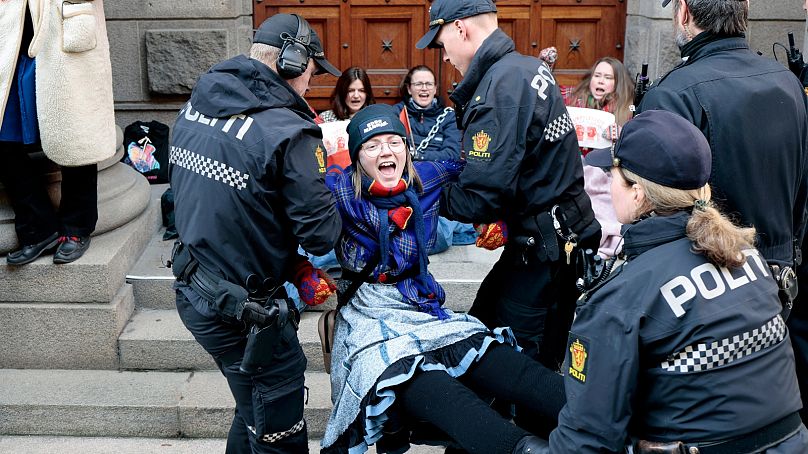In Finland the Sámi Parliament Act is stalled in parliament, while in Norway the community faces challenges from wind farms on traditionak land.
Europe's indigenous Sámi people have taken their fight for improved rights to the United Nations.
 ADVERTISEMENT
ADVERTISEMENT
 ADVERTISEMENT
ADVERTISEMENT
A delegation from Finland, home to the EU's only recognised indigenous population, appealed for help to keep the incoming government on-track with legislative reforms.
Earlier this year, politicians in Helsinki failed to get the long-awaited Sámi Parliament Act out of committee stage in time for a vote before the end of the parliamentary year.
Sanna Marin has previously apologised after a Euronews investigation revealed how little progress had been made on the Act during her time in office -- an important document which is supposed to redefine the relationship between the Finnish State and the Sámi people.
This week the President of the Sámi Parliament in Inari, Tuomas Aslak Juuso, gave an impassioned address to the United Nations Permanent Forum of Indigenous Issues about the human rights challenges facing Finland's Sámi community.
He described the existing legislation as "outdated" and told the UN Forum that much of the impetus for consulting and drafting new statutes, which had been years in the making, were because of rulings made by the UN -- which said the current Sámi Parliament Act violates human rights conventions.
"We are deeply disappointed that the long-delayed reform did not move ahead also during this Government’s term. The Sámi people must again wait longer for their human rights to be," said Juuso.
"We urge Finland to immediately revise the Act on the Sámi Parliament based on the bill negotiated during Prime Minister Sanna Marin’s term and in a manner that respects the right of the Sámi people to exercise their self-determination," he told Forum members, asking them to monitor any progress the Finnish government makes, going forward.
It is not yet clear whether Finland's new government -- which is still being negotiated -- will even make the Act a priority. In general, parties on the right of the Finnish political spectrum have been more resistant to change the status quo for Sámi people.
Climate changed flagged up as mental heatlh problem
There were, however, some positive developments to report to the UN, with the launch of mental health initiatives in traditional Sámi homelands, where people can make an oppointment or just drop in for advice and help in their own language.
The support unit was established in June 2022, as part of Finland's ongoing Sámi Truth and Reconciliation Commission process.
"It offers mental health services in accordance with Sámi culture and in Sámi languages at a low threshold – advice, support and crisis work in their own mother tongue -- Northern Sámi, Inari Sámi, Skolt Sámi, and Finnish," explained Pirita Näkkäläjärvi, from the Sámi Parliament in Inari, who also spoke at the United Nations.
Although the unit was first established to support the work of the Commission, it can also be contacted also for other purposes such as psychological distress caused by climate change.
"Climate change is affecting mental health of the Sámi in significant ways," explaind Näkkäläjärvi.
"Rising temperatures, and the unpredictability of natural conditions and weather affect the traditional livelihoods and utilisation of the Arctic nature resulting in wide-spread social, environmental, and economic impacts in the Arctic," she said.
"There is general anxiety about the future with an alarming climate crisis."
More issues for Sámi across the High North
President of the Saami Council, Áslak Holmberg, highlighted problems for Sámi people in Russia where they were not able to hold free elections to choose local representatives around Murmansk.
He also noted that Norway continues to "ignore the ruling" of its own Supreme court, which ruled that Europe's largest on-land wind power plant was illegalt, and violates Sámi rights.
"This is a major land-grab done in the name of the green shift [transition]," Holmberg said.
"Where are we to turn to, when even when we win in court, we still lose? The state of Norway must be reminded to act immediately on this ruling, and stop overlooking its own judiciary and the Sámi people’s rights."
Holmberg highlighted too, concerns for the environment around traditional Sámi grounds near Kiruna, in northern Sweden, where the government recently approved an iron ore mining concession "without consent from the Sámi communities."
"The states need to respect the international human rights law and national laws, they themselves have signed. The need for strong, independent Sámi representative bodies and respect to our territorial rights are now needed as much as ever."











